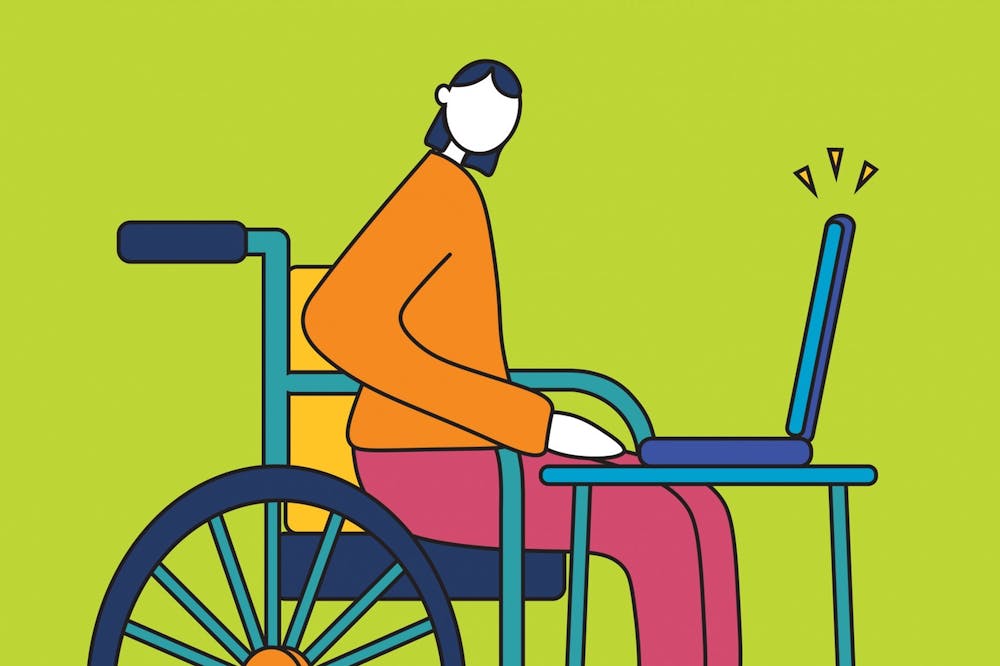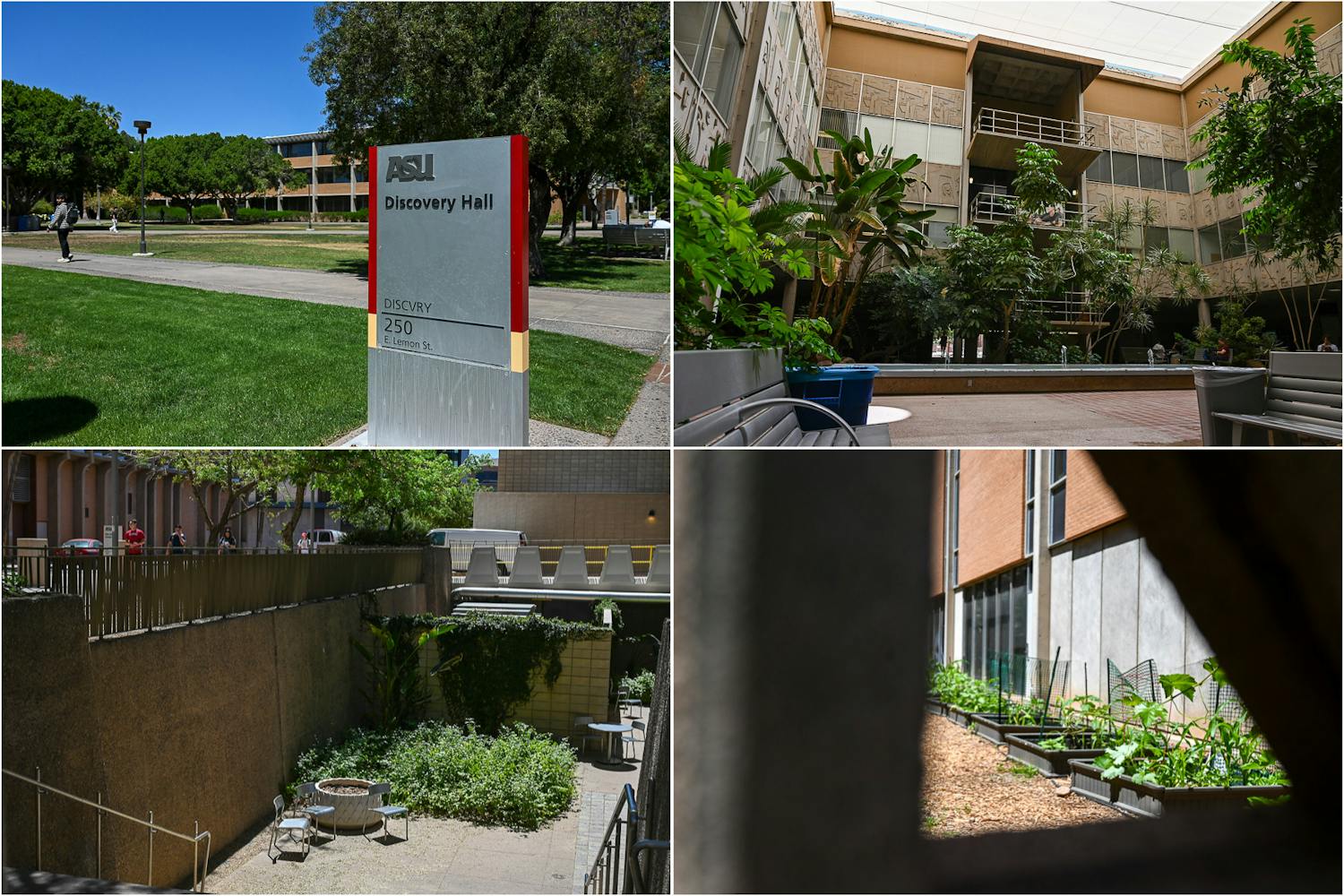In March, President Donald Trump signed an executive order that aims to dismantle the Department of Education. Recent cuts to the agency have raised concerns about how colleges, including ASU, will continue to support students with disabilities.
ASU law student Katie Allee, president of the Disabled Law Student Association at ASU, has cerebral palsy, which affects the way she walks, talks and moves. As a leader within the organization, she advocates for disabled students and voices their challenges on campus.
"I worry that cuts to this area can really negatively impact the little resources that are already available," Allee said. "What is that going to look like if we cut funding and start enforcing disability related laws in inconsistent ways?"
The layoffs of hundreds of staff from the Office of Federal Student Aid could potentially delay FAFSA processing and financial aid disbursement, creating a critical issue for disabled students who often rely on federal funding for accommodations and support services.
Additionally, the DOE's Office for Civil Rights, which investigates accessibility issues such as college compliance with the Americans with Disabilities Act or disability discrimination, has been impacted by mass staffing cuts, according to ProPublica.
"Without it, the accountability piece goes away for states and schools and the risk of not complying increases," Allee said. "And there's a risk of school absenteeism, disengagement that could rise as students with disabilities face more troubles and access to services they need."
In the U.S., roughly 21% of undergraduates reported living with a disability, according to the National Center for Education Statistics. With the potential cut of resources, the visibility of this community in higher education is at risk.
"It is strange right now, because a lot of the laws that we've been educated on for forever are now jeopardized," Allee said. "We're not sure whether they're going to continue standing as they are, if they're going to change or if they're even going to be enforced."
Accessibility is not a one-size-fits-all experience at ASU. Some students with disabilities mention delays, bureaucracy infrastructure and accommodation limits that could worsen if federal funding for education continues to face cuts.
"I have had a complex relationship with the accessibility resources at ASU," Allee said. "There's a lot of changes we've requested that have not been addressed. There's accessibility issues with the infrastructure of our law building, and even just accessible doors that have not worked for the entire time I've been in law school."
In a written statement, ASU's Student Accessibility and Inclusive Learning Services emphasized its commitment to accessibility, noting that the University is required to provide accommodations under Title II of the Americans with Disabilities Act.
"We will not be impacted because our funding is not reliant on the Department of Education," a University spokesperson said in a written statement. "In alignment with our charter, we have an obligation to our students and will continue to support their success."
This commitment to an equitable education is written across ASU's campuses, but lived experiences reveal gaps in the support systems.
Accessibility Coalition at ASU marketing director Jessica Lopez, a junior studying business online, said her personal experience with ASU's SAILS has been a process-heavy but smooth transition.
Lopez has been working on a research project dedicated to recognizing institutional and legislative gaps in the U.S. The project, "Anti-Ableism in Higher Education," is a literature review that offers guidance, support and analyses of policy in education.
"It can be a lot harder to get those accommodations because you don't have enough documentation," Lopez said. "It's a lot easier to accommodate somebody when their disability is visible versus invisible."
Without the Department of Education, universities could lose access to grants for accessibility upgrades, resources for special education programs and federal protections that secure accommodation rights.
The Department of Education is also responsible for enforcing several federal laws, including Section 504 of the Rehabilitation Act and the ADA, which guarantee access to classroom accommodations, accessible campus facilities and fair grievance procedures for students with disabilities.
The ongoing court case Texas v. Becerra contributes to uncertainty for disability protections. 17 states are suing the U.S. government to have Section 504 of the Rehabilitation Act declared unconstitutional.
Section 504 is a law that prohibits discrimination against individuals with disabilities in any program receiving federal funding, including schools, hospitals and businesses. It requires these organizations to make reasonable accommodations for people with disabilities.
"I think that's very telling of who is welcome in education and who is not," Lopez said. "From a policy standpoint, that is proving that disabled students are not welcome on campus. Schools need to be very intentional about actively combating to say that students are welcome on campus."
Lopez is counting down the days until her graduation. She worries that future students may face greater barriers, especially if federal funding and oversight for disability services disappear.
"I can't wait to get out of the education system, because I'm absolutely terrified of how these policies are going to trickle down and impact money," Lopez said. "A lot of students are going to be forced to drop out and I don't think schools are going to attribute it to their failure to accommodate them, I think they're going to continue to attribute it to personal failures."
Catherine Novotny, a law student at ASU and member of the Disabled Law Student Association at ASU, shares concern about what the future holds for disabled students.
"I'll be graduating soon," Novotny said. "I'm not going to be the student anymore, but I really worry about the kids in elementary school. … There's just a lot of tension."
"Accessibility has always been hard, but you know, this new administration is going to make it 10 times harder."
Novotny, who was born deaf in one ear and hard of hearing in the other, uses an interpreter and a note taker for her classes. Law school moves fast, the information is dense and the pace relentless. With accommodations, she said she's been able to thrive in a demanding field.
"I've been telling everyone, I would not have been able to graduate law school, let alone any previous schools without access to interpreters," Novotny said. "The note takers have really helped as well. So for me, it was not only an accessibility moment, but a self advocacy moment."
Students with disabilities are often expected to advocate for themselves when navigating systems, requesting resources and educating others in institutions they attend.
"Something that disabled students get told a lot is you need to self advocate, and it is a good skill to have," Novotny said. "But at the same time, it's a really frustrating skill to have to develop, because in an ideal world, the accessibility would already be there."
On campus, accessibility takes many forms: ramps, extended test times, interpreters, quiet spaces. But Novotny said real inclusion goes beyond accommodations; it's about redesigning how institutions view people with disabilities altogether.
"People have virtue, regardless of their disability and they shouldn't have to outperform (it)," Novotny said. "They should be able to live with their disability, receive accommodations, and just be there."
Resources for students with disabilities at ASU include:
I AM Mentor Program - One-on-one peer support.
Growth Achievement Transformation Enrichment (GATE) - Develops skills through executive function workshops for neurodivergent students
Devils Adapt - Adaptive Personal Training for students with disabilities
Edited By Tiya Talwar, Sophia Braccio, and Katrina Michalak.
Reach the reporter at bmclar14@asu.edu and follow @clark_brande13 on X.
Like The State Press on Facebook and follow @statepress on X.
Brandelyn is a senior studying journalism and mass communication. This is her first semester with The State Press. She has also worked for Lake Affect Magazine, ICT News and Cronkite News.




